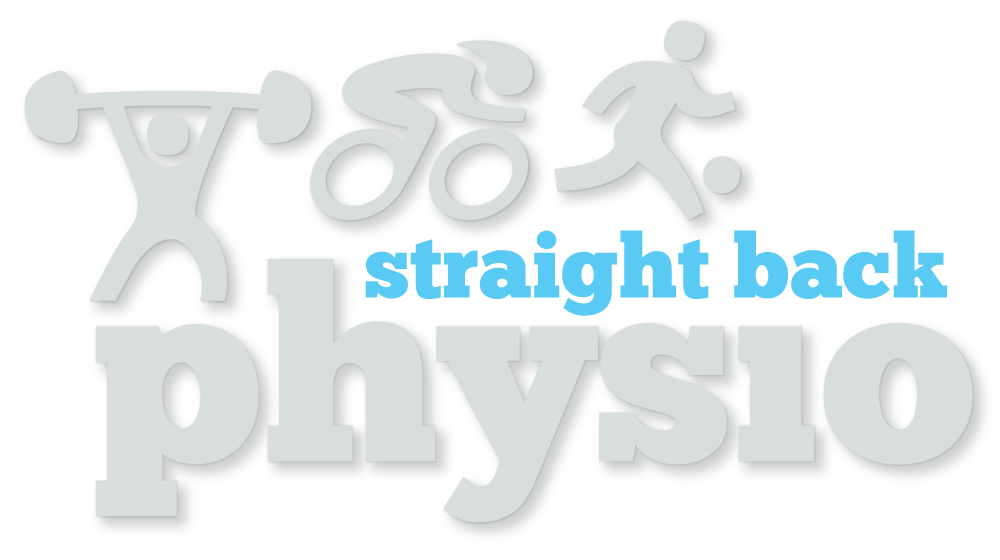physiotherapy for Knee Pain in Cheltenham
your path to stronger, pain-free knees
Why Knee Pain Happens?
Knee pain can result from injury, overuse, arthritis, or mechanical issues. Understanding the cause is key to effective treatment, whether that’s rest, physiotherapy, or medical intervention. Straight Back Physio in Cheltenham offers tailored physiotherapy for knee pain, focusing on natural pain relief, improved mobility, injury prevention, and personalized care.
Why Use a Physiotherapist for Knee Pain?
- Natural Pain Relief – Gentle, evidence‑based techniques reduce pain through movement, strengthening muscles, improving posture, and restoring mobility, without relying on medication or invasive procedures.
- Improved Mobility – Physiotherapy focuses on safe, guided strategies to improve mobility, reduce discomfort, and strengthen the knee for long‑term health.
- Strengthening support – Targeted exercises build muscle strength to protect the knee joint. A tailored strengthening program supports the joint, improves stability, and allows patients to return to daily activities and sports safely
- Injury Prevention – Physiotherapy prevents knee injuries by strengthening supporting muscles, improving flexibility, correcting movement patterns, and teaching safe strategies for sport and daily life.
- Personalised Care – Every knee injury is unique, whether it’s a sports sprain, ligament tear, arthritis, or post‑surgical recovery. Physiotherapy provides personalised care plans designed around your specific condition, lifestyle, and goals.
What Treatments May Include
- Manual therapy - Joint mobilisations and soft tissue massage is used to ease stiffness and tension, relax tight muscles, and improve circulation.
- Guided exercises - Focus on strengthening, stretching, and retraining movement to relieve pain and prevent injury. They are safe, progressive, and tailored to each patient's needs, making them a cornerstone of rehabilitation..
- Postural training - Focuses on assessment, corrective exercises, ergonomic advice, and sports‑specific retraining. By improving alignment and movement habits, patients experience less pain, recover faster, and perform at their best.
- Education - Guidance on pacing activity, avoiding aggravating movements, and gradually increasing load. Advice on footwear, ergonomics, and safe lifting techniques.
Common Knee Pain Conditions We Treat
- Anterior Knee Pain
- Knee Bursitis (Housemaids Knee)
- Knee Cartilage Damage (Maniscus Tears)
- Knee Ligament injuries (ACL, MCL sprains)
- Patella Tendonitis and overuse injuries
- Patellofemoral pain (Runner’s Knee)
- Post‑surgical rehabilitation
- Osteoarthritis and age‑related wear
What to Expect
The number one consideration when selecting knee pain treatment is an accurate diagnosis of the underlying cause. Without knowing whether the pain stems from arthritis, ligament injury, cartilage damage, or overuse, treatment choices may be ineffective or even harmful.
At Straight Back Physio you can expect a thorough assessment, tailored exercises, hands‑on treatment if needed, and clear guidance on how to manage and prevent future flare‑ups. Your physiotherapist will then create a treatment plan designed to relieve pain, restore mobility, and help your recovery from knee injury so you can get you back to doing what you love.
Types of knee pain
Anterior knee pain
Knee injuries in sports are common. Anterior Knee Pain is a general term used to describe pain originating from the structures at the front of your knee. The most common structures that cause pain in this area are the joint between your knee cap and your thigh bone, and the patella tendon which attaches your thigh muscles to the bone, just below the knee cap. It is usually linked to overuse rather than injury and is often seen in young sporting adults, although anyone can be affected.
Physio for anterior knee pain treatment is the preferred option, we aim to identify which factors are influencing your knee joint pain and to correct these with rehabilitation exercises to help strengthen the hip and knee region, improve flexibility of your hamstrings, and we will talk to you about reducing pain in your activities. Manual therapy can help correct the alignment of the knee joint and
acupuncture is effective at reducing inflammation and pain.
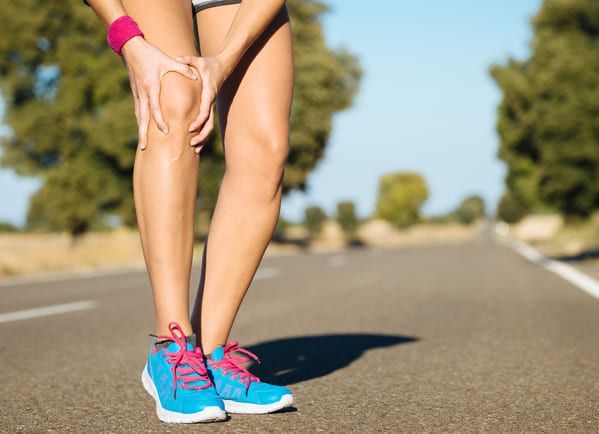
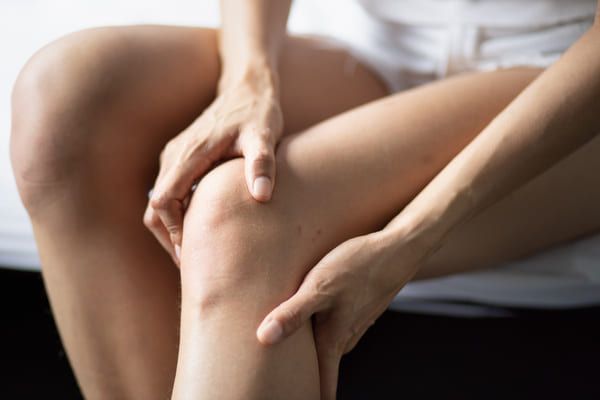
Knee Bursitis
Sometimes referred to as housemaid's knee, bursae are small fluid filled sacs that reduce friction between moving parts of the body's joints, and bursitis is inflammation or irritation of the bursae in the knee.
There are many causes including a heavy blow to the knee, jobs that require long periods of kneeling, fungal or bacterial infection, rheumatoid arthritis, prolonged periods working in front of a computer, and playing sports where a lot of pressure is placed on the knee joint such as football or squash.
Physiotherapy treatment for knee bursitis can reduce pain, swelling, and stiffness in the knee, and restore mobility in the knee. Treatment for 2-8 weeks will swelling management, stretching, and strengthening exercises.
Knee cartilage damage
The menisci and articular cartilage don’t have their own nerve supply (which transmits pain) however normally when the cartilage is damaged, surrounding structures are damaged too, causing pain. Knee joint cartilage damage is often due to a trauma where you twist your knee while your foot is planted and knees are bent as in squash, but it can also be due to repeated wear and tear of the meniscal cartilage as you get older.
Physiotherapy is often recommended as a non-invasive treatment so that surgery can be avoided, but it is also required after knee cartilage surgery. Physiotherapy strengthens your knee and helps to regain full range of motion. Manual therapy helps to stretch out the tension in the soft tissue surrounding your knee, and reduces swelling. Acupuncture helps reduce pain and inflammation in the healing knee cartilage, but high-quality rehabilitation is required to address the underlying cause.
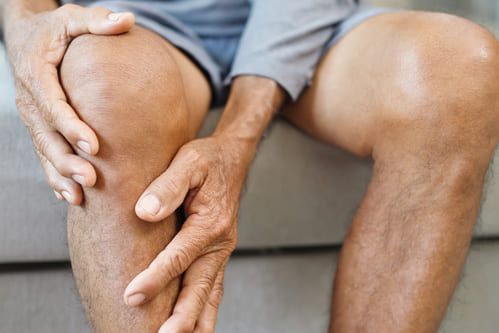
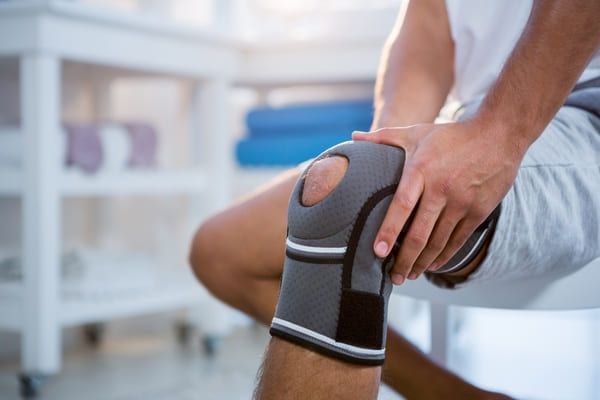
Knee ligament injury
Knee ligaments are like ropes made up of lots of thin collagen fibres that are bunched in groups to form the ligament. If a force exceeds the strength of the knee ligament it can tear causing pain and inflammation. Ligament damage may be caused by trauma, such as a car accident, or by a blow, stretching or twisting of the knee in sports such as a football tackle, but can also be caused from a fall or twisting when stepping down from a step.
Physiotherapy treatment for knee ligament injuries focuses on strengthening muscles, while restoring mobility as the ligament heals. Massage applies deep pressure on the ligament causing new scar tissue and enabling it to heal, manual therapy helps to reduce pain and improve joint mobility, acupuncture can decrease inflammation and pain, and shockwave therapy can promote healing of ligaments and reducing pain. Pilates is good at strengthening and aligning the knee muscles, and improving mobility.
Patellar tendonitis
Also known as jumpers knee is a relatively common soft tissue injury, it can occur in sports that mainly involve running and jumping such as tennis and football, but can be seen with too much weighted squats and hill running. It is classed as an overuse injury that occurs when the tendon is unable to adapt to the level of strain placed on it causing tendon fiber damage.
Patellar tendonitis treatment includes manual therapy to improve movement, reduce muscle stiffness, and soft tissue massage. Rehabilitation exercises based on loading and muscle strength to correct weaknesses and imbalances in the muscles. Acupuncture can help relieve pain, reduce inflammation, and promote healing. Certain exercises in Pilates can help reduce inflammation and bring back normal tendon function. Shockwave therapy is an effective treatment for all soft tissue injuries.
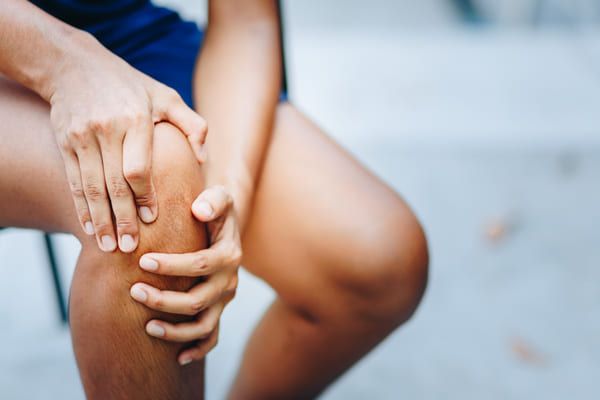

“Straight Back Physio treated the root cause of my knee issue, not just the symptoms. I was also given exercises and advice to build on the treatment at home. My knee now feels great and I’m back training and racing. I would definitely recommend Straight Back Physio!”
David H
Book now
Schedule an appointment with a knee pain physiotherapist in Cheltenham, Gloucestershire, we provide a comprehensive approach to knee pain treatment, utilizing various recommended therapies specifically designed to help you stay free from pain and injuries. Our preventative services are aimed at supporting your overall well-being and boosting your activity levels.
Recover faster, our chartered physios can usually get you back to redoing the activities you can't do now within 4 to 8 sessions.
We understand that some people may want to find out a bit more about the cost before they book an appointment at our physiotherapy clinic. Our unique
save as you recover packages can save you up to 20% on the cost of a single session.
Insured
For insured clients we can either work directly with your insurance provider or offer receipts for cash-based plans, allowing you to reclaim your expenses.
Not Covered by Insurance
If you want see the best physiotherapist in your area, feel free to book an appointment at our Cheltenham physiotherapy clinic without needing a referral from your GP.
Why Choose Us
No other local physiotherapy clinic can match our level of expertise and rehabilitation services, thanks to our extensive experience and in-house gym facilities. You'll receive the full benefits of physiotherapy through a tailored combination of interventions designed to guide you on your path to recovery.
